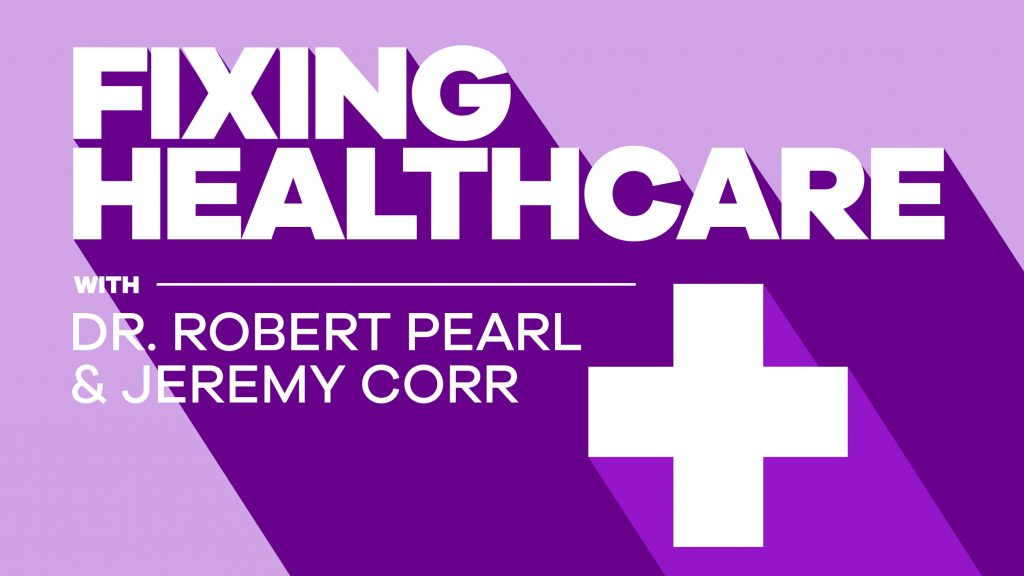At the end of Episode 17, Fixing Healthcare co-hosts Dr. Robert Pearl and Jeremy Corr turned to listeners for ideas and suggestions about the role of government in healthcare.
This regular feature of season three comes by way of the new Fixing Healthcare Survey. Please click the link and give us your input. Robert and Jeremy might share your ideas on a future episode.
This month, we heard from Steven Magagna, Ryan T. Mackman and Jennifer Sear who who all agree the U.S. government should do more to address social determinants of health.
Transcript from Fixing Healthcare (Episode 17)
Robert Pearl: Let’s move to listener feedback from the current Fixing Healthcare survey. This season we asked for listener answers to this important question: “How can the U.S. government best improve healthcare?” I encourage anyone with additional innovative ideas to submit them on the website robertpearlmd.com. We still have a couple of shows on this topic this season.
Jeremy Corr: For this episode, we heard from listeners Steven Magagna, Ryan T. Mackman and Jennifer Sear who all agree the U.S. government should do more to address social determinants of health. Robbie, for those who may not be familiar with this term, what are social determinants?
Robert Pearl: The social determinants of health include demographic factors like where we’re born and raised; the zip code where we live and the places where we work, play, and socialize. They also include economic factors and access to healthy foods. Together, they exert a tremendous influence over our life expectancy, as well as our mental and physical well-being. In fact, researchers estimate that social determinants of health are six times more likely to affect our risk of premature death than the medical care we receive. I’m eager to hear what our listeners had to say about this topic.
Jeremy Corr: Steven Magagna says the government should focus on providing safe housing, reliable transportation and better educational opportunities for low-income populations. Ryan T. Mackman points out that ride-sharing companies like Uber and Lyft have already started working with Medicare Advantage to offer beneficiaries non-emergency medical transportation. He thinks the government can expand ride sharing services in ways that benefit enrollees, such as delivering their prescription medications and transporting them to social events to combat the growing epidemic of loneliness. Finally, Jennifer Sear says the answers lie in preventive medicine and mental health reform, with an emphasis on addressing the social determinants of health.
Jeremy Corr: Robbie, you’ve written and talked extensively about social determinants in the past. What do you think about our listeners’ suggestions?
Robert Pearl: All too often, we fail to understand the impact of social determinants when we think about ways to improve health and longevity. But the data is indisputable. I remember speaking at a national event in Washington D.C. two years ago on improving healthcare in underserved communities, particularly for people with chronic diseases. One of presenters reported the results of a survey she’d conducted among users of a free clinic in the community. When these patients were asked about their biggest healthcare issues, none of them mentioned medical problems. Instead it was the lack of safe housing, heat, food and reliable transportation. We will not be able to address the healthcare needs of our nation without a coalition of leaders from businesses, the government, social services and traditional medicine.
Jeremy Corr: Once again, thanks to Steven Magagna, Ryan T. Mackman, Jennifer Sear, and everyone who has participated in the Fixing Healthcare survey on RobertPearlMD.com.
* * *
READ: Full transcript for Episode 17 with James Carville
Fixing Healthcare is a co-production of Dr. Robert Pearl and Jeremy Corr. Subscribe to the show via Apple Podcasts or wherever you find podcasts. Join the conversation or suggest a guest by following the show on Twitter and LinkedIn.

